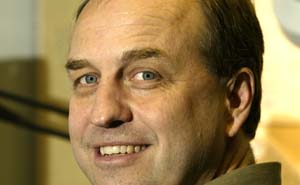 |
| Climatologist Andrew Weaver is described as a "colourful and outspoken academic." He is the author of Keeping Our Cool: Canada in a Warming World. |
An upswing in ocean acidity. Damaged coral reefs. Rising sea temperatures and the melting ice cap.
“Oceans and Climate Change” is the theme of this year’s Killam Public Lecture Series. The series kicks off on Thursday, Oct. 1 with a lecture by Andrew Weaver entitled “Global Warming: The Scale of the Problem and the Path to the Solution.”
“Climate change affects all of us,” says Katja Fennel, assistant professor in the Department of Oceanography and an organizer of the Killam series. “We can’t say we’re not interested in this.”
Dr. Weaver is the Canada Research Chair in Climate Modeling and Analysis in the School of Earth and Ocean Sciences at the University of Victoria. He is a leading authority on global climate change, acting as the lead author on the United Nations Intergovernmental Panel on Climate Change (IPCC). Along with former U.S. Vice President Al Gore and his international partners, the distinguished scientist was awarded the Nobel Peace prize for his work with the IPCC in 2007. He is also the author of Keeping Our Cool: Canada in a Warming World, a comprehensive and engaging examination and explanation of global warming, with a specific emphasis on climate change in Canada.
“He’s a pretty famous climate scientist and we’re very lucky to have him,” says Dr. Fennel. “I believe he’ll cover potential ways we can correct global climate change, so it’s a good way to open the whole topic up.”
Dr. Weaver’s talk is sponsored jointly by the Ransom Myers Lecture in Sciences and Society. Ransom Myers, a well-known fisheries scientist and advocate for marine conservation who taught and conducted research at HÂţ», passed away in March of 2007. The lecture series has been organized in his honour.
“This is our second annual lecture dedicated to Dr. Myers,” says Boris Worm, now the head of the former Myers Marine Biology Lab at HÂţ». “It just so happened that the Killam lecture series was interested in the same person, Dr. Weaver, so we decided to come together and put on a nice event.”
Ěý
Dr. Worm says the late Dr. Myers would have appreciated Dr. Weaver’s work. “He would be very excited to meet him and to learn from him … I can just see his excitement about this.”
Dr. Myers, like Dr. Weaver, had an interest in how science affects society and what individuals can do to make a difference. “He was always very interested in witnessing how society deals with science, environmental challenges in particular, and how we are able to identify a problem and deal with it,” says Dr. Worm.
The lecture will take place on Thursday, Oct. 1 at 7:30 p.m. in Ondaatje Hall, Marion McCain building. Students and faculty are encouraged to attend.
Other lectures in the Killam series are: “The Warming Arctic Ocean” by Louis Fortier, professor at Université Laval, on Nov. 26 and “Ocean Acidification” by Victoria Fabry, California State University, on Dec. 3. Both lectures take place at 7 p.m. in Ondaatje Hall.
LINK:
